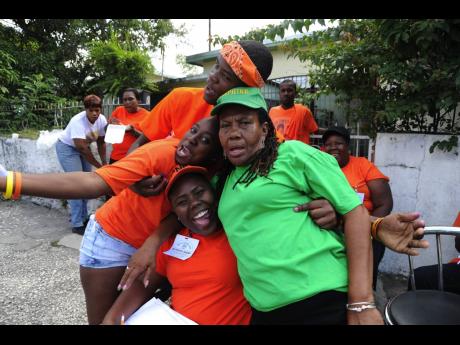CAMPAIGN CROWD CRISIS - COVID concern soars as election fever rises
Pressure is growing on the Holness administration to expedite the drafting of stricter rules governing crowd control at political events to safeguard against coronavirus risks amid heightened anticipation of a general election.
Nudges for a muscling up of the Disaster Risk Management Act (DRMA) – which gives teeth to the policing of conduct in public and private spaces – come at a time when COVID-19 infections have risen to 928, as at August 5, with eight new cases recorded over the last 24 hours. Of the 121 active cases, seven patients are moderately ill, and 40 people have been hospitalised.
The flouting of generic COVID-19 health protocols in election campaigning has raised concerns for the general secretaries of the two major political parties who have conceded that they have found it impossible to restrict the growing throngs.
The struggle to enforce compliance among political supporters has escalated with the teasing enchantment surrounding the announcement of the election date. Crowds have grown at political spot meetings and are expected to become denser as the temperature of the hustings reaches fever pitch.
Scores of persons were seen without masks during Prime Minister Andrew Holness’ tour of communities in Clarendon North Central on Tuesday.
General secretary of the ruling Jamaica Labour Party (JLP), Dr Horace Chang, said it was especially difficult to get the crowd in Chapelton to comply with the health protocols.
“We are not supposed to have a crowd. We ask for not more than a certain amount of people to come, but people come out spontaneously, so we had to give them masks,” Chang said.
“We have insisted every time we went on the stage that they should wear masks, and we have given the candidates masks to hand out, which they did.”
Chang said it was easier to control the crowd in previous gatherings in communities such as Steer Town, St Ann, for example, because a large field was used to stage the event.
“I had the problem in Brown’s Town last week, and I just had to cut the ceremony short and get out,” he said, before insisting, “It is a challenge we are going to face in the campaign, but we will follow the public health protocols.”
General secretary of the People’s National Party (PNP), Julian Robinson, said that he is unsure what protocols will govern the hosting of campaign events.
“I don’t know what the guidelines will be. For example, the 250-person rule, I don’t know if that is what will obtain for us, so in a sense, as a party, we are observing what the current protocols are, but I don’t know in a campaign period how we would operate,” he said.
The 250-person limit cited by Robinson refers to the number of patrons allowed to attend entertainment and leisure events under the DRMA. The legislation holds a range of restrictions governing gatherings, hygiene, among other strictures.
Robinson was seen along with co-Campaign Directors Phillip Paulwell and Peter Bunting, as well as St Ann North West Member of Parliament Dayton Campbell, touring sections of the Brown’s Town Market in St Ann on Wednesday. They were all captured in photos not wearing masks. Supporters were also in breach.
“It is not easy when you are on a walk to keep on the mask. It is not. In fact, we had our masks with us. I had mine in my pocket, he (Campbell) had his, everybody, the leaders had theirs, but it is difficult when you are on a walk to keep on your mask,” Robinson told The Gleaner on Wednesday.
The general secretary admitted that based on images he has seen of campaign events across the political divide, enforcing social-distancing rules will be a Herculean task. That will be especially problematic on nomination day, where parties traditionally preen and posture on streets swollen with thousands of colourfully adorned partisans and snaking motorcades.
With the election apparently imminent, Robinson said that it is time for a clear protocol to be designed and published.
“It is something I intend to raise with the JLP general secretary and see if we can have an understanding,” he said.
Health Minister Dr Christopher Tufton acknowledged, in an interview with The Gleaner on Wednesday, that although the current COVID-19 protocols apply, additional rules would have to be drafted.
“The leaders, whoever those leaders are, political or otherwise, they would have to comply with any protocol, and to the extent that they may want to organise or congregate, then those protocols would apply to them and the leadership they provide,” he said.
Meanwhile, Glasspole Brown, director of elections, said that the Electoral Office of Jamaica signed off on COVID-19 protocols with the Ministry of Health a little over a week ago to ensure public safety on election day and nomination day.
“On nomination day, we are going to restrict the number of persons that are allowed in the nomination centre. Everybody will have to have their masks on, they would have to have their hands sanitised, [and] their temperature will be taken before entering the nomination centre,” Brown told The Gleaner.
Similar measures will be in force on election day, he said.
Brown said that his team is ready in the event that a general election is called soon.
More than 22,000 presiding officers, poll clerks, reserves, and supervisors are now fully trained. All nomination, counting, and polling centres have also been identified. Training in the use of the electoral verification identification system, which is needed for select constituencies, is almost complete, Brown said.
A general election is constitutionally due by March 2021.

